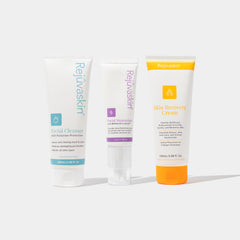The summer months can leave skin dehydrated, stressed, and showing early signs of aging. UV radiation, heat, and environmental stressors take a toll, compromising the skin’s elasticity and moisture balance (Rinnerthaler et al., 2015). Rejuvaskin’s Advanced Firming Cream, formulated with powerful peptides, antioxidants, and hydrating ingredients, offers a scientifically backed solution to restore post-summer skin health and radiance.
Understanding Summer’s Impact on Skin
Prolonged sun exposure triggers the breakdown of collagen and elastin, leading to sagging and fine lines. UV rays stimulate matrix metalloproteinases (MMPs), enzymes that degrade dermal proteins essential for firm skin (Quan et al., 2009). Simultaneously, heat and dehydration disrupt the skin barrier, increasing transepidermal water loss (TEWL) and contributing to dryness and sensitivity (Verdier-Sévrain et al., 2007).
Advanced Firming Cream: A Multifaceted Approach to Skin Recovery
Rejuvaskin’s Advanced Firming Cream leverages cutting-edge skincare science to address these issues. Its formulation is designed to improve skin elasticity, texture, and hydration.
-
Peptides for Collagen Support
Palmitoyl Hexapeptide-12, a potent peptide included in Advanced Firming Cream, helps stimulate collagen production and improve skin firmness. Clinical studies have shown that peptides can significantly enhance skin elasticity and reduce the appearance of fine lines and wrinkles (Schagen et al., 2007). -
Hydration and Skin Barrier Repair
Key moisturizing ingredients like aloe vera and squalane replenish hydration and strengthen the skin’s protective barrier. These ingredients lock in moisture, preventing transepidermal water loss (TEWL) while enhancing skin softness and smoothness (Papakonstantinou et al., 2012). -
Antioxidants to Combat UV Damage
The cream includes antioxidant-rich extracts such as arnica, calendula, and aloe vera, which help protect the skin from the free radical damage caused by UV exposure. These antioxidants soothe inflammation and support skin repair, promoting overall skin health and radiance (Pandel et al., 2013). -
Nourishing Butters and Oils for Elasticity
Theobroma cacao (cocoa) seed butter and Butyrospermum parkii (shea butter) provide rich emollients that improve skin elasticity. These nourishing butters help combat the dryness caused by heat and environmental stress, making the skin feel more supple and hydrated. -
Soothing Botanicals for Recovery
Symphytum officinale (comfrey) extract, arnica, and allium fistulosum (onion) bulb extract work together to reduce skin irritation, support the healing process, and calm inflammation, making it ideal for post-sun care (Rinnerthaler et al., 2015).
Seasonal Skin Care Tips
As patients transition from summer to fall, suggest these essential skincare practices:
-
Use Collagen-Boosting Products: Recommend peptides and products like Advanced Firming Cream to rebuild collagen and improve skin texture after sun exposure.
-
Maintain Hydration: Encourage the use of creams that contain humectants and emollients, such as glycerin and shea butter, to restore moisture balance.
-
Incorporate Antioxidants: Advocate for antioxidant-rich products to help neutralize residual oxidative stress from summer UV exposure.
-
Consistency with Sunscreen: Remind patients that sun protection is crucial year-round, even as UV intensity decreases. Mineral sunscreens, like Rejuvaskin’s Mineral Facial Sunscreen, offer optimal protection by reflecting harmful rays and preventing skin damage.
Why Recommend Advanced Firming Cream?
Rejuvaskin’s Advanced Firming Cream offers a scientifically formulated solution to post-summer skin recovery. Its combination of peptides, antioxidants, and moisturizing agents helps restore skin firmness, hydration, and radiance. With regular use, patients will experience visible improvements in skin texture and elasticity, making it an ideal treatment for all skin types.
References
Pandel, R., Poljšak, B., Godic, A., & Dahmane, R. (2013). Skin photoaging and the role of antioxidants in its prevention. ISRN Dermatology, 2013, 930164. https://doi.org/10.1155/2013/930164
Papakonstantinou, E., Roth, M., & Karakiulakis, G. (2012). Hyaluronic acid: A key molecule in skin aging. Dermato-Endocrinology, 4(3), 253-258. https://doi.org/10.4161/derm.21923
Quan, T., Fisher, G. J., & Voorhees, J. J. (2009). Molecular mechanisms of photoaging in human skin in vivo and their prevention by all-trans retinoic acid. Photochemistry and Photobiology, 85(1), 1-8. https://doi.org/10.1111/j.1751-1097.2008.00416.x
Rinnerthaler, M., Bischof, J., Streubel, M. K., Trost, A., & Richter, K. (2015). Oxidative stress in aging human skin. Biomolecules, 5(2), 545-589. https://doi.org/10.3390/biom5020545
Schagen, S. K., Zampeli, V. A., Makrantonaki, E., & Zouboulis, C. C. (2007). Discovering the link between nutrition and skin aging. Dermato-Endocrinology, 4(3), 298-307.
Verdier-Sévrain, S., Bonté, F., & Gilchrest, B. (2007). Biology of estrogens in skin: Implications for skin aging. Experimental Dermatology, 15(2), 83-94. https://doi.org/10.1111/j.1600-0625.2005.00342.x




















